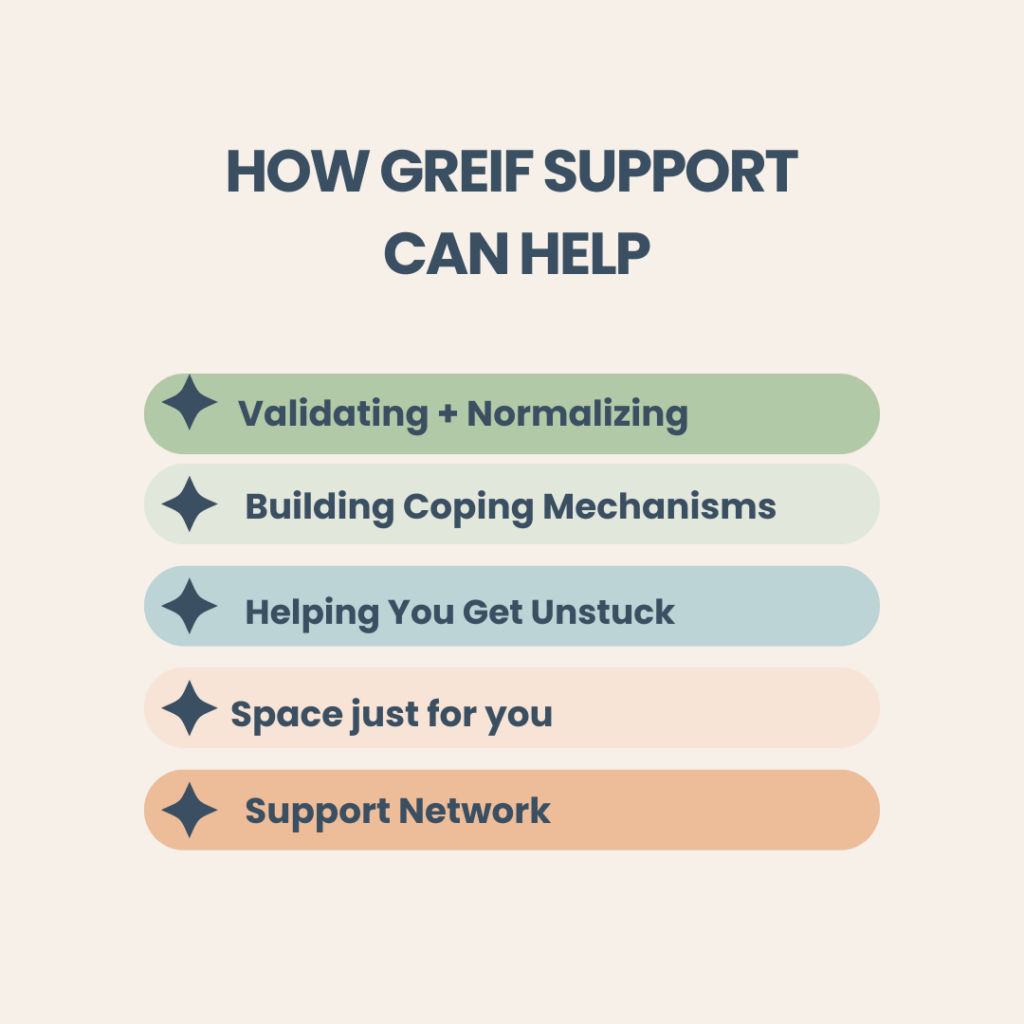Angela Prior
lcsw, ryt, ciec
hey there!
The AP blog is here for all things mental health, embodiment, yoga, and burnout. Poke around and take what you need.
meet angela
Navigating Grief
May 19, 2025
Grief. A word that carries the weight of loss, a universal human experience that can feel profoundly isolating in its intensity. It’s not just about the death of a loved one; grief can accompany the end of a relationship, a significant life change, the loss of a dream, or even a shift in our own abilities. Whatever its source, grief is a complex tangled ball of emotions – sadness, anger, confusion, guilt, relief, shame, and even moments of happiness.
Grief is a natural response to any loss and it can significantly impact our mental health. The intensity of emotions, upheaval of life, disruptions of routine, sorrow, and the profound sense of absence can contribute or exacerbate existing mental health conditions. Sometimes the pain of grief can become so persistent and debilitating that it evolves into complicated grief, a condition characterized by prolonged and intense grief reactions that significantly impair daily functioning.
Grief support within mental health treatment acknowledges that grief is not a linear process with a set timeline. It recognizes the individual nature of loss and the unique way each person experiences and processes their pain. Because acknowledging that grief doesn’t just go away. Grief is an experience that can forever change our very being.
I’m reminded of the image that demonstrates how grief doesn’t shrink over time but that we grow around our grief creating more space between us and it. That is why even after decades thinking about a loss, an anniversary, or a missed milestone can still trigger an intense sensation and response.
Grief support in therapy offers a multifaceted approach to healing after loss, addressing various emotional and practical needs. Here’s how it helps with the specific areas you mentioned:

1. Validation and Normalizing a Person’s Experience:
- Acknowledge the Uniqueness: Grief is a deeply personal journey with no right or wrong way to feel.
- Normalize Grief Responses: Normalizing the wide range of feelings (sadness, anger, guilt, confusion, numbness) and behaviors (withdrawal, restlessness, changes in sleep or appetite).
- Instill Self-Compassion: fostering self-compassion and radical acceptance to diffuse feelings of doubt and guilt
2. Building Coping Mechanisms:
- Developing Healthy Strategies: Identifying practices to help manage the intensity of grief.
- Identifying Existing Strengths: Recognizing your own resilience and build upon your already existing coping skills
3. Helping with Getting Unstuck:
- Identifying Stuck Points: In complicated grief, you can become “stuck” in certain stages or emotions. Identify ways to help remove these road blocks
- Processing Unresolved Issues: Providing a space to explore and process any unresolved issues or complicated emotions related to the loss
- Facilitating Adaptation: Identifnying your “new normal” how your life looks like now :finding new routines, redefining identity, and reinvesting in life while still honoring the memory of their loved one.
4. A Space Just For You:
- Uninterrupted Focus: Therapy sessions are dedicated solely you and your grief experience. Unlike conversations with well-meaning friends or family, the focus remains entirely on their needs and feelings.
- Confidentiality and Non-Judgment: Therapy is confidential and a non-judgmental space where you can express even the most difficult or socially unacceptable thoughts and emotions without fear of criticism.
- Objective Perspective: It can be nice to have an objective 3 party person who has “no skin in the game” to provide a perspective
5. Increasing Your Support Network and Resources:
- Identifying Existing Support: Assessing your current support network
- Connecting with Grief Support Groups: Helping to connect you with additional supports and resources in your community or online to help with combating feelings of isolation
Navigating grief is a deeply personal journey, and one that will never be linear. Giving yourself permission to grieve fully and seek support when you need is a crucial part in honoring your loss and nurturing your own wellbeing.

eight free meditations
To Support Your Mental Health
Let's Work Together
Meet Our Team of Therapists + Yoga Instructors